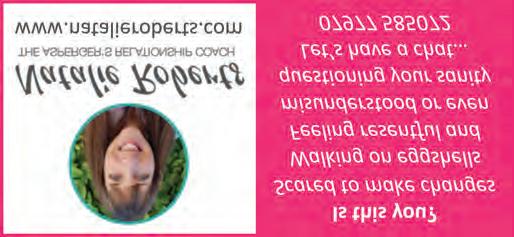
4 minute read
Autism Spectrum Conditions
Autism Spectrum Conditions: differences, NOT disabilities By Shelley Goffe-Caldeira
Autism Spectrum Conditions (ASC) are lifelong developmental conditions which affect how people communicate and interact with the world. They affect approximately 700,000 people in the UK and, whilst awareness and understanding has improved, families dealing with ASC continue to face significant challenges in day-to-day life.
Autism is not a medical condition that can be treated with medication and there is no cure. The fact that there is a spectrum of autism simply means that autism can be different for each individual. It is usually detected in early childhood but for some people it is not formally diagnosed until later in adult life. Autism is the most common in a range of conditions, which include Asperger’s syndrome.
How to identify autism If a child is autistic, they will be autistic their whole life. There are many signs and symptoms to watch out for and all or some can be present in any individual with autism. Some typical characteristics may include:
• Difficulty making eye contact • Difficulty with social interaction • Repetitive behaviours and activities such as arm flapping, head banging, or twirling an object over and over • Rigid behaviour and difficulty with change and routines • Narrow range of interests and activities • Intense and prolonged emotional reactions • Sensory challenges.
Gone are the days when autism was blamed on parenting practices. Today, it is widely agreed by scientists that autism is a combination of genetic and environmental factors. The purported link between vaccines and autism has been comprehensively dismissed.
In the last decade, there has been a dramatic increase in the number of diagnosed cases of autism around the world but this could be due to doctors spotting the signs more consistently. Researchers are investigating environmental triggers and biochemical factors to understand what causes autism.
Autism is NOT a disability In general society, attitudes have rightly become more accepting of the differences in children and people with autism. The biggest change in attitude is the understanding that autism is not a disability but a difference.
Children with autism will still be able to make friends, and form relationships. Some children will exhibit average or above average intelligence – many of the world’s greatest thinkers and innovators have displayed autistic characteristics – while others might have a learning disability and will need help with daily life and routines.
How do I know if my child has autism? In order for someone to be diagnosed with autism, they’ll generally have to be assessed as someone whose symptoms ‘limit and impair everyday functioning’, who struggles with social interaction and communication and has had repetitive and limited hobbies, interests and patterns of behaviour from early childhood onwards.
However, the characteristics of autism and Autism Spectrum Conditions vary widely from one person to the next. Autistic children often have other conditions like: attention deficit hyperactivity disorder (ADHD), epilepsy, dyslexia, anxiety and depression that must be formally and separately diagnosed.
If you are concerned that your child may be on the autistic spectrum, ask your GP for a referral to a paediatrician. Early diagnosis and intervention using skills-training and behaviour modification by a professional can help create positive results. It can also greatly improve the chances of a child with autism going to or remaining in mainstream school and participating in activities with their classmates. For more information, check out Need2Know’s Essential Guide to Autism at need2knowbooks.co.uk/product/the-essentialguide-to-autism/ which explores the different types of autism including causes, early signs and related conditions. To receive a 25% discount, quote N2K25OFF at checkout.
Natalie Roberts coaches individuals and couples where one partner has or is suspected to have Autism/Asperger’s. She explains: “Autism/Asperger’s is hidden by the time many people reach adulthood, especially if they are undiagnosed. They’ve learned to mask, to fit in, and are often experiencing mental health and self-esteem issues. Relationships are challenging for women and men with Autism/Asperger’s and if those relationships encounter difficulty, specialist knowledge and approaches are needed to create the positive outcomes so desperately needed for families to thrive. The Top 3 issues people seek help for are communication, exhaustion and ‘I don’t know who I am anymore’.”
Natalie experienced these challenges firsthand when her husband, aged 56, was diagnosed with Asperger’s. They’d been married for 15 years and Natalie subsequently discovered she had Cassandra Syndrome, an associated and little talked about reactive disorder. Natalie has shared her story of recovering herself and her relationship in Courage: Stories of Darkness to Light, a bestselling collection of true stories, with all proceeds going to Samaritans and available on Amazon.
“The journey through life with someone who has undiagnosed Autism/Asperger’s can be lonely and without a map. Natalie describes how to achieve a sense of selfdirection and to eventually share the journey together” (Tony Attwood, Clinical Psychologist and Author) natalieroberts.com











